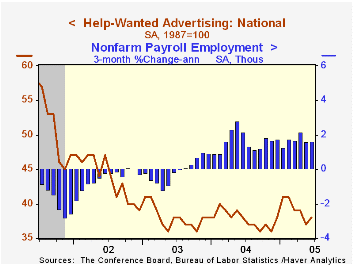 Global| Jul 28 2005
Global| Jul 28 2005Help-Wanted Advertising Inched Up
by:Tom Moeller
|in:Economy in Brief
Summary
The Index of Help-Wanted Advertising from the Conference Board inched up to 38 last month. The low reading equaled the average level for the quarter. During the last ten years there has been a 64% correlation between the level of [...]

The Index of Help-Wanted Advertising from the Conference Board inched up to 38 last month. The low reading equaled the average level for the quarter.
During the last ten years there has been a 64% correlation between the level of help-wanted advertising and the three month change in non-farm payrolls.
The proportion of labor markets with rising want-ad volume rose modestly to a still low 39%.
The Conference Board surveys help-wanted advertising volume in 51 major newspapers across the country every month.
The latest help wanted report from the Conference Board is available here.
| Conference Board | June | May | June '04 |
|---|---|---|---|
| National Help Wanted Index | 38 | 37 | 38 |
Tom Moeller
AuthorMore in Author Profile »Prior to joining Haver Analytics in 2000, Mr. Moeller worked as the Economist at Chancellor Capital Management from 1985 to 1999. There, he developed comprehensive economic forecasts and interpreted economic data for equity and fixed income portfolio managers. Also at Chancellor, Mr. Moeller worked as an equity analyst and was responsible for researching and rating companies in the economically sensitive automobile and housing industries for investment in Chancellor’s equity portfolio. Prior to joining Chancellor, Mr. Moeller was an Economist at Citibank from 1979 to 1984. He also analyzed pricing behavior in the metals industry for the Council on Wage and Price Stability in Washington, D.C. In 1999, Mr. Moeller received the award for most accurate forecast from the Forecasters' Club of New York. From 1990 to 1992 he was President of the New York Association for Business Economists. Mr. Moeller earned an M.B.A. in Finance from Fordham University, where he graduated in 1987. He holds a Bachelor of Arts in Economics from George Washington University.






